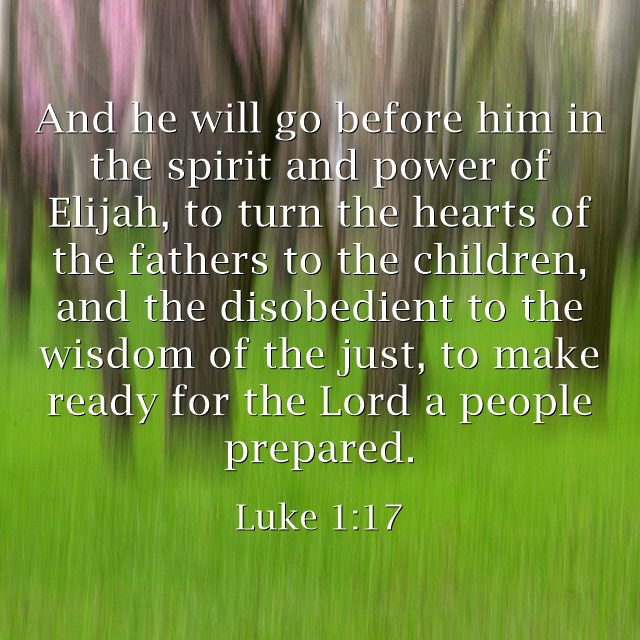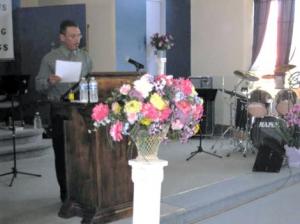Here are seven Bible verses about Elijah the Prophet.
First Kings 17:1 “Now Elijah the Tishbite, of Tishbe in Gilead, said to Ahab, “As the Lord, the God of Israel, lives, before whom I stand, there shall be neither dew nor rain these years, except by my word.”
Israel was about at its lowest ebb because King Ahab had fallen into Baal worship and “he took for his wife Jezebel the daughter of Ethbaal king of the Sidonians, and went and served Baal and worshiped him” (1st Kings 16:31) and “Ahab did more to provoke the Lord, the God of Israel, to anger than all the kings of Israel who were before him” (1st Kings 16:33) so this is shortly after Elijah, who appears out of nowhere, warns the king that there is a coming drought and this drought will create a severe famine.
First Kings 17:16 “The jar of flour was not spent, neither did the jug of oil become empty, according to the word of the Lord that he spoke by Elijah.”
When the Lord had instructed Elijah to go to Zarephath, he saw “a widow was there gathering sticks. And he called to her and said, “Bring me a little water in a vessel, that I may drink.” And as she was going to bring it, he called to her and said, “Bring me a morsel of bread in your hand” (1st Kings 17:10-11), but the widow said “I have nothing baked, only a handful of flour in a jar and a little oil in a jug. And now I am gathering a couple of sticks that I may go in and prepare it for myself and my son, that we may eat it and die’” (1st Kings 17:12). Elijah tells her “The jar of flour shall not be spent, and the jug of oil shall not be empty, until the day that the Lord sends rain upon the earth” (1st Kings 17:14). That’s exactly what happened.
First Kings 17:22 “And the Lord listened to the voice of Elijah. And the life of the child came into him again, and he revived.”
Elijah does a few things that Jesus did. One is that he was able to raise the dead on more than one occasion. After the widows child died, she seemed to blame Elijah (1st Kings 17:18) who then blamed God (1st Kings 17:20) but “Then [Elijah] stretched himself upon the child three times and cried to the Lord, “O Lord my God, let this child’s life come into him again” (1st Kings 17:21) and the Lord did listen to him and the child was revived.
First Kings 18:21-22 “And Elijah came near to all the people and said, “How long will you go limping between two different opinions? If the Lord is God, follow him; but if Baal, then follow him.” And the people did not answer him a word. Then Elijah said to the people, “I, even I only, am left a prophet of the Lord, but Baal’s prophets are 450 men.”
Elijah may have had an occasional bought with fear but here he is standing up against 450 false prophets but there were more than just these 450 men as it says there were “450 prophets of Baal and the 400 prophets of Asherah, who eat at Jezebel’s table” (1st Kings 18:19) so try 850 against one but as Martin Luther said, (paraphrasing), “One plus God is a majority.” The response was found in First Kings 18:36 where it says, “And at the time of the offering of the oblation, Elijah the prophet came near and said, “O Lord, God of Abraham, Isaac, and Israel, let it be known this day that you are God in Israel, and that I am your servant, and that I have done all these things at your word,” after which, “the fire of the Lord fell and consumed the burnt offering and the wood and the stones and the dust, and licked up the water that was in the trench. And when all the people saw it, they fell on their faces and said, “The Lord, he is God; the Lord, he is God” (1st Kings 18:38-39).
Second Kings 2:11 “And as they still went on and talked, behold, chariots of fire and horses of fire separated the two of them. And Elijah went up by a whirlwind into heaven.”
Elijah was about to go into glory, but first he needed to pass on the mantel of the prophet leadership through Elisha, so Kings 2:9 states that “When they had crossed, Elijah said to Elisha, “Ask what I shall do for you, before I am taken from you.” And Elisha said, “Please let there be a double portion of your spirit on me” (2nd Kings 2:9). Elijah said “You have asked a hard thing; yet, if you see me as I am being taken from you, it shall be so for you, but if you do not see me, it shall not be so” (2nd Kings 2:10). That’s just the moment that the chariot of fire took Elijah into glory.
Luke 1:17 “And he will go before him in the spirit and power of Elijah, to turn the hearts of the fathers to the children, and the disobedient to the wisdom of the just, to make ready for the Lord a people prepared.”
When Jesus was speaking about John the Baptist, He acknowledged that he was playing a prophetic role in preparing the way for Jesus Christ. The angel of the Lord had said a similar thing when speaking with John the Baptist’s father, Zechariah “And he will turn many of the children of Israel to the Lord their God” (Luke 1:16).
James 5:17 “Elijah was a man with a nature like ours, and he prayed fervently that it might not rain, and for three years and six months it did not rain on the earth.”
James, the half-brother of Jesus, was writing about prayer and wrote that “the prayer of faith will save the one who is sick, and the Lord will raise him up. And if he has committed sins, he will be forgiven” (James 5:15) and so “confess your sins to one another and pray for one another, that you may be healed. The prayer of a righteous person has great power as it is working” (James 5:16). James is saying, “God has not changed. He can do whatsoever He wills to do and through whomever He chooses to do it.
Conclusion
Right after Elijah was able to call fire down from heaven, “Jezebel sent a messenger to Elijah, saying, “So may the gods do to me and more also, if I do not make your life as the life of one of them by this time tomorrow” (1st Kings 19:2) so you would think that since Elijah stood up to 850 false prophets, what’s one person (Jezebel)? Instead or praying to God for help or a solution, “he was afraid, and he arose and ran for his life and came to Beersheba, which belongs to Judah, and left his servant there” (1st Kings 19:3) and “he asked that he might die, saying, “It is enough; now, O Lord, take away my life, for I am no better than my fathers” (1st Kings 19:4). That’s what I call, giving up. How many of us have ever felt like that?
Article by Jack Wellman
Jack Wellman is Pastor of the Mulvane Brethren Church in Mulvane Kansas. Jack is also the Senior Writer at What Christians Want To Know whose mission is to equip, encourage, and energize Christians and to address questions about the believer’s daily walk with God and the Bible. You can follow Jack on Google Plus or check out his book Teaching Children the Gospel available on Amazon.















